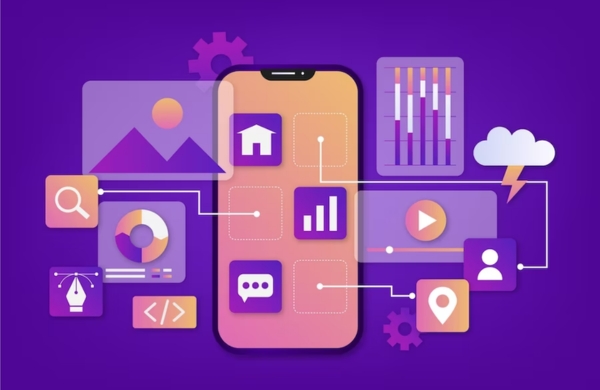
In the modern digital economy, mobile app development has become a critical component of enterprises. Businesses from all sectors are investing in choosing mobile app development to broaden their customer base and boost income, including those in banking, healthcare, education, and entertainment.
Hybrid app development has become famous for startups looking to build their mobile presence. Hybrid apps combine the best of both worlds the flexibility of web-based apps and the performance of native apps.
This approach offers several benefits to help startups save time, money, and resources while delivering a high-quality user experience.
What Is Hybrid App Development?
Creating a single app that works on all mobile operating systems, including Android, iOS, and Windows, is called hybrid app development.
A hybrid app employs a single code base for every OS, unlike native app development, which requires programmers to use a platform-specific programming language to create apps for several operating systems.
Here are some of the key benefits of hybrid development over native mobile app development for startups:
Cost-effective
Cost efficiency is one of the main benefits of hybrid app development. In contrast to native applications, hybrid apps take less time and are inexpensive since they are constructed utilizing web technologies like HTML, CSS, and JavaScript.
Once the hybrid apps are made, you can distribute them across various platforms, saving the expense of creating separate apps for each platform.
Faster Development
Because hybrid apps employ online technologies that most developers are already familiar with, they take less time than native apps. Developers may reuse code across various platforms when creating hybrid apps, cutting costs and development time.
Due to this, it is simple for developers to quickly release their software and obtain a competitive advantage in the market.
Also Read: Top 4 Differences between white Label app and Custom app
Cross-Platform Compatibility
In addition to Android, iOS, and Windows, hybrid apps work on other platforms as well. So, without having to create unique apps for each platform, entrepreneurs can reach a larger audience with their apps.
Hybrid app development provides a uniform user experience across several platforms, which is critical for preserving corporate identification and retaining user engagement.
Access to Native Features
Startups are able to create feature-rich hybrid applications without sacrificing speed because hybrid apps can use native functions like the camera, GPS, accelerometer, and more.
This is because they utilize the device’s native functionality as hybrid applications make use of a native wrapper. This makes it possible for startups to deliver a high-quality user experience that meets the expectations of modern users.
Offline Functionality
You can have an app through an experienced hybrid mobile app development company that will work offline as well. This is a major advantage for startups that want to provide their users with uninterrupted access to their apps.
Hybrid apps store data locally on the device, which allows users to access the app even when they are not connected to the internet. This is especially important for startups that operate in areas with poor network connectivity.
Easy Maintenance
Hybrid apps are easier to maintain than native apps because they use web technologies that are already familiar to most developers.
This means that startups easily find developers who can maintain their apps without spending time and money on training them. Moreover, you can update the hybrid apps in real-time. So fixing bugs and adding new features to the app without going through the app store approval process is another advantage.
Scalability
Hybrid apps are highly scalable. That means a startup can easily add new features and functionalities to their app as their business grows. This is because hybrid apps use web technologies that are flexible and adaptable, making it easy for developers to add new features and functionalities without having to rebuild the app completely.
Also Read: Top 10 Tools For Mobile App Developers in 2022
Conclusion
Hybrid app development is an intelligent choice for startups looking to build a mobile presence. It offers several benefits, including cost-effectiveness, faster development, cross-platform compatibility, access to native features, offline functionality, easy maintenance, and scalability.
These benefits can help startups save time, money, and resources while delivering a high-quality user experience that meets the expectations of modern users.

Leave a Reply